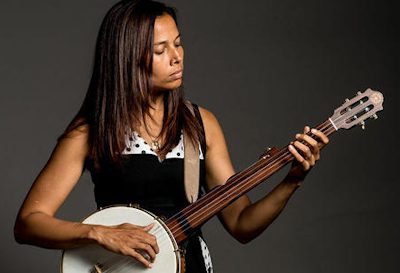RHIANNON GIDDENS
RHIANNON GIDDENS
MacArthur Genius Grant Recipient Comes to Disney
Walt Disney Concert Hall – October 25, 2017
 Grammy-Award winning string band Carolina Chocolate Drops brought singer-songwriter Rhiannon Giddens to national prominence, though each member of the band is now on their own. Giddens has embarked on a solo career that reached a pinnacle of success last night at Walt Disney Concert Hall in a sold out debut performance celebrated by the most enthusiastic and immediate standing ovation I have ever witnessed. Her performance was nothing short of magical and spectacular—the perfect culmination to a week that began with her winning the rarefied MacArthur “Genius Grant” award—which she describes as a life-changing event.
Grammy-Award winning string band Carolina Chocolate Drops brought singer-songwriter Rhiannon Giddens to national prominence, though each member of the band is now on their own. Giddens has embarked on a solo career that reached a pinnacle of success last night at Walt Disney Concert Hall in a sold out debut performance celebrated by the most enthusiastic and immediate standing ovation I have ever witnessed. Her performance was nothing short of magical and spectacular—the perfect culmination to a week that began with her winning the rarefied MacArthur “Genius Grant” award—which she describes as a life-changing event.
You can’t compete for it; so it’s not quite accurate to call it an award; and you can’t apply for it; so it’s not quite correct to call it a “grant;” and yet it’s been called both; it’s bestowed from on high as if by an angel—The MacArthur Foundation. It’s been named by the general public without regard for dictionary technicalities—the “Genius Grant.” For present purposes it is worth noting that the word “genius” and the word “folksinger” do not generally appear in the same sentence. But there is no question that Rhiannon Giddens is a folk singer—and with this recent award (noted on FolkWorks homepage beneath the video of her recent annual address before the IBMA) we are happy to note that she has thus singularly elevated the status of folk singers across the land. One of us made it! It’s good for the folks!
Giddens had a band with four musicians who appeared on her new album Freedom Highway including Louisiana’s Dirk Powell who backed her up on acoustic guitar and shared the vocals on the title track, Jason Sypher on double bass and electric bass, Jamie Dick on drums, and the one remaining band member from the Chocolate Drops (who comes from Brooklyn), Hubby Jenkins on mandolin, guitar, banjo, bones and vocals. It was a great ensemble that even pulling out all the stops never overwhelmed their headliner.
She’s telling the whole story—from slavery to freedom—and carrying a torch for the music that lit the way. It was an incandescent show—that inspired the audience to keep exclaiming (from the row behind me) “Beautiful!” and “Fantastic.” I had heard Ms. Giddens on the radio many times from Garrison Keillor’s Prairie Home Companion stages, and interviewed on TV as well, but she is transformed in a live concert to something in another dimension. Barefoot underneath a floor-length dress, she danced, sang, scatted and played virtuoso old-time banjo and fiddle—as well as classical violin. It was a prodigious combination of musical skills that she brought to bear on an ancient tradition of Black American music history.
But that is not the only tradition she honors in last night’s dazzling performance. She also sings a Patsy Cline country classic written by Hank Cochran, She’s Got You:
She’s Got You (#1 song in 1962)
I’ve got your picture that you gave to me
And it’s signed “with love,” just like it used to be
The only thing different, the only thing new
I’ve got your picture, she’s got you.
With her opera-trained voice Giddens sang this Patsy Cline (and later on Loretta Lynn) hit song like she was to the manor born. It’s a great crossover departure from her own roots and once again brought the audience to its feet.
But for this old folkie, my favorite homage of Rhiannon Gidden’s show was her extraordinary tribute to the mother of all folk singers. She ranged far and wide through Odetta‘s repertoire starting with I’ve Been Driving On Bald Mountain, Water Boy, and Jack a-Diamonds, then included her classic Oh Freedom, which Odetta sang at the March on Washington August 28, 1963. It was a bravura tribute to one of the essential artists of the folk revival. Giddens has now placed herself in the modern tradition of folk music—a link on the chain both before and after the chain was broken. To see that a great artist has come along to join and celebrate that long tradition is thrilling.
Then Rhiannon Giddens gave her band mate Hubby Jenkins time to shine in another homage—to the groundbreaking rock guitarist Sister “Rosetta” Tharpe. Jenkins jumped all over the fret board covering a multitude of styles, beginning with some definitive finger-style picking on the lower frets and gradually moving up to more of a rock style blues and moving chord patterns up at the top. It was a graduate class in acoustic guitar from a modern master, and demonstrated why Tharpe is acknowledged by Bonnie Raitt as one of her major influences. Bravo to Rhiannon Giddens for singling her out to include in this brilliant survey of African-American music from the Abolitionist period to the beginnings of rock and roll in the 1940s to the breakthrough period of the civil rights movement in the early-to-mid sixties. She illustrated both the continuity and seminal milestones of this powerful tradition, including both her original and traditional songs, and contemporary songs by her significant influences. It was a redefining moment in how she has truly reshaped our understanding of folk music’s sources and a great performance in and of itself.
Giddens devoted the final portion of the concert to highlight her most recent album Freedom Highway. It begian with her emotional wrecking crew of a song to underscore the beginnings of slavery—based on a direct quote from a slave-auction: At the Purchaser’s Option. That’s the lead track on her album, which took her to the final song, written by Pops Staples, Freedom Highway. The song delineated the long march to freedom taken by black Americans from slavery times to the March on Washington to the great Selma-to-Montgomery march that culminated in the Voting Rights Act of 1965. Rhiannon Giddens took her audience on a well-defined musical journey that was fully integrated with African-American history—her music told an epic story that is able to fill a concert with the drama of an entire people’s quest for freedom. Giddens’ birthday, almost uncannily, is February 21, 1977—not just in Black History Month, but on the very date Malcolm X was assassinated in 1965.
And yet, immersed as she is in the social struggles she brings to her artistry—the message never submerges or overwhelms the music. On the contrary, the music—as for the great University of Toronto literary critic Marshall McLuhan—is the message. His classic book The Medium is the Message was published in 1967—and is now celebrating its 50th birthday. The way Giddens uses music to tell her story is perfectly in keeping with the spirit of McLuhan’s own message.
Rhiannon’s banjo, as she proudly pointed out, is a pain-staking replica of a pre-Civil War banjo made in 1858. The story she told came from that same era, and her banjo reflects it in every detail. It’s one thing to hear a spiritual like Go Tell It On the Mountain sung with modern instruments—however deeply felt—and quite another to hear it accompanied by an instrument that an African-American slave might actually have used—especially since the banjo—alone of all major musical instruments—was brought here and further developed here by slaves. In Giddens’ extraordinary hands, the instrument itself is the message—with its distinctive emphasis on the bass strings and notes in sharp contrast to the emphasis in bluegrass and even old-time music on the treble strings. Her banjo is the voice of slavery’s yearning for freedom—the bass representing the existential state of bondage and the gradual unfolding of the higher treble strings the symbol of breaking chains. It is the kind of banjo that was used in minstrel shows by black Americans all during Stephen Foster’s career—and Dan Emmett’s as well. It wasn’t only “black-faced” white minstrels, but real black minstrels who played this kind of banjo—as well-documented in the most famous painting of a banjo player ever.
For Giddens to keep this banjo in circulation is a proud statement of where she comes from—and how music embodies our history even when we have managed to escape it. She opened the show with her banjo, singing Spanish Mary,” a song she wrote for The New Basement Tapes based on Dylan’s lyrics he had never set to music. That’s how she wound up in T-Bone Burnett’s Town Hall concert—to perform the new album’s worth of Dylan—inspired songs.
Only then did Giddens pick up her fiddle and show how to completely fill the hall built for the entire Los Angeles Philharmonic Orchestra (“LA Phil”) with one violin. Her breathtaking performance prompts the violinist who happened to be sitting next to me to wipe his brow and cheeks and neck with his handkerchief, and sigh, “It’s getting kind of warm in here, isn’t it?” “Not for us guitar players,” I reply—using Vladimir Horowitz/s great comeback to a violinist who accompanied him to the 16-year-old Jascha Heifitz’s debut concert at Carnegie Hall. I have been waiting for twenty years to be able to use that line—and thanks to Rhiannon Giddens finally got the chance to dust if off.
Late in the show Rhianna Giddens finally got around to mentioning her recent award—without actually naming it. But her sheer excitement, uncontrolled élan vital and brio got the better of her as she exclaims, “Just try to shut me up now!”
Well, I don’t think anyone could, or would even want to. She is on the side of the better angels of our nature~ and we can just sit back and enjoy her. But let her own words say it best, from one of her Freedom Highway songs, We Could Fly:
You can take my body
You can take my bones
You can take my blood
But you can’t take my soul.
Bravo! The loss of the Carolina Chocolate Drops is definitely our gain. Congratulations Rhiannon Giddens!
October 27—the 70th anniversary of the first HUAC hearings that led to the imprisonment of the Hollywood Ten, October 27, 1947, and the beginning of the Blacklist in Hollywood. The Blacklist was broken in 1960 by Kirk Douglas and Dalton Trumbo (one of the imprisoned screenwriters), who finally saw his real name credited onscreen for the movie Spartacus—based on the novel by Howard Fast—which depicted a Thracian slave who stood up to the Romans, and whose fellow slaves stood up for him when asked “Who is Spartacus?” with the immortal words, “I am Spartacus!”
With thanks and much appreciation to LA Phil’s PR Consultant Laura B. Cohen for a last-minute press pass. In the sold-out Disney Hall, I got the 2265th seat.
Ross Altman has a PhD in Modern Literature; he belongs to Local 47 (AFM); Ross may be reached at greygoosemusic@aol.com













